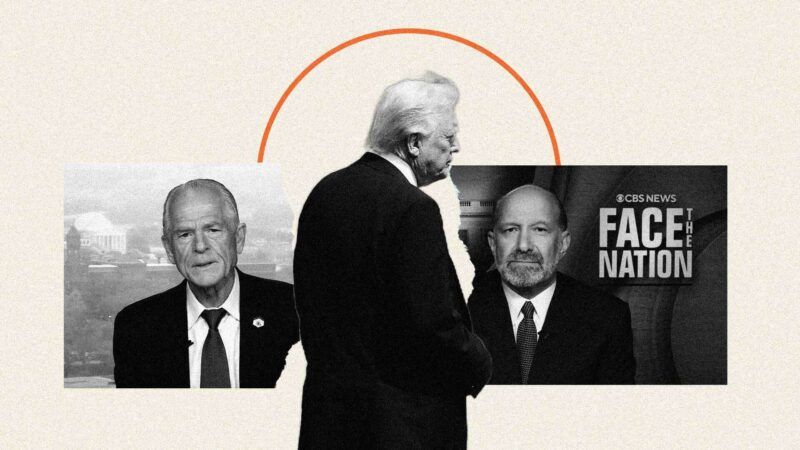Trump Advisors Struggle To Defend, or Even Explain, His Tariff Strategy
Members of the administration spent the weekend presenting contradictory defenses of Trump's economic policies.

President Donald Trump's "reciprocal" tariffs went into effect over the weekend, imposing a 10 percent tax on imports from nearly every nation on the planet. (Additional higher tariffs on a subset of countries will go into effect Wednesday.) The U.S. stock market then plunged, seeing its worst week since the onset of the COVID-19 pandemic and the worst two-day drop in history, with the market losing $6.6 trillion in value. Asian markets similarly saw precipitous declines when they opened this week.
As Trump's advisors took to the Sunday morning talk shows to defend their boss' plan, one thing became clear: There was no plan.
"Are these tariffs permanent? Or are they a negotiating tactic?" Kristen Welker asked Treasury Secretary Scott Bessent on Meet the Press. "Some administration officials have said they're permanent. President Trump himself has said he's open to negotiating."
Bessent hedged that this would be Trump's decision, but he added that the president had "created maximum leverage for himself, and more than 50 countries have approached the administration" about renegotiating.
Kevin Hassett, director of the National Economic Council, agreed. He told ABC, "I got a report from the [Office of the U.S. Trade Representative] last night that more than 50 countries have reached out to the president to begin a negotiation."
But that wasn't the message every advisor was offering.
"This is not a negotiation," White House trade advisor Peter Navarro told Fox News. "This is a national emergency based on a trade deficit that's gotten out of control because of cheating."
"There is no postponing" the tariffs, Commerce Secretary Howard Lutnick told CBS. "They are definitely going to stay in place for days and weeks." When asked about the other advisors' claims that 50 countries had offered to negotiate, Lutnick replied, "The tariffs are coming. He announced it, and he wasn't kidding."
If Trump's advisors aren't sure what the policy is, that may be because Trump himself hasn't kept his story straight. On Thursday, Trump told reporters that the new trade barriers "give us great power to negotiate." The following morning, on the other hand, he posted on Truth Social that "MY POLICIES WILL NEVER CHANGE." And on Monday, after China retaliated with new tariffs against us, the president responded that "all talks with China concerning their requested meetings with us will be terminated" and "negotiations with other countries…will begin taking place immediately."
When he announced the tariffs last week, Trump said they were necessary to correct a trade imbalance between the U.S. and the rest of the world that he sees as predatory. "For decades, our country has been looted, pillaged, raped, and plundered by nations near and far, both friend and foe alike," he said at the time. "Now it's our turn to prosper."
"Large and persistent annual U.S. goods trade deficits have led to the hollowing out of our manufacturing base," the White House claimed in a fact sheet released to coincide with the announcement. "These tariffs will remain in effect until such a time as President Trump determines that the threat posed by the trade deficit and underlying nonreciprocal treatment is satisfied, resolved, or mitigated."
This wasn't the argument offered in an earlier order, where Trump placed a tariff on Canada and Mexico "to combat the extraordinary threat to U.S. national security, including our public health posed by unchecked drug trafficking." Trump himself added, "This Tariff will remain in effect until such time as Drugs, in particular Fentanyl, and all Illegal Aliens stop this Invasion of our Country!"
And last week, Navarro said Trump's tariffs would "raise about $600 billion a year, about $6 trillion over a 10-year period"—which would certainly imply that he expects them to be in place that long.
So tariffs are a negotiating tactic, or they're a punishment to use until countries act the way we want, or they're a permanent policy for generating revenue. Got it?
Trump has always been inconsistent on tariffs, presenting them both as a short-term negotiating maneuver and as a long-term source of government revenue. And he remains convinced, despite all evidence to the contrary, that trade deficits mean America is getting "ripped off."
Over the weekend, Trump advisors also struggled to defend the financial havoc their boss' policies had wrought.
Kristen Welker asked Bessent if the market disruption, including more than $6 trillion in lost wealth, was "part of the plan."
"What I've been very impressed with is the market infrastructure, that we had record volume on Friday and everything is working very smoothly," Bessent replied. "So, the American people, they can be very—take great comfort in that." (Indeed, Friday did see trade volume at an all-time high—"indicative of a market in complete panic, with trading volumes going haywire," in the words of Sherwood News.)
"Trillions of dollars of factories are going to be built in America," Lutnick said. "The army of millions and millions of human beings screwing in little screws to make iPhones, that kind of thing is going to come to America."
That's also unlikely: As The New York Times reported in 2019, during Trump's first term and amid an earlier trade war with China, Apple already tried to shift some of its production to the U.S. but "struggled to find enough screws" to meet its demand. "In China, Apple relied on factories that can produce vast quantities of custom screws on short notice….Apple has found that no country—and certainly not the United States—can match China's combination of scale, skills, infrastructure and cost."
As Trump's advisors would struggle to defend these tariffs, one thing is clear: The confusion comes from the very top.


Show Comments (43)